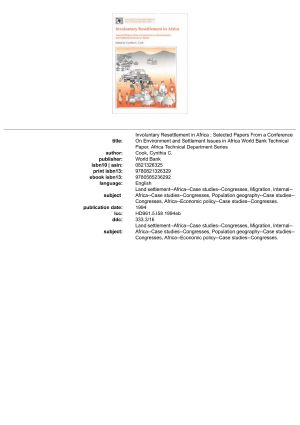Involuntary Resettlement in Africa · Selected Papers From a Conference on Environment and Settlement Issues in Africa

- Authors
- Cook, Cynthia C.
- Publisher
- World Bank Publications
- Tags
- test
- ISBN
- 9780821326329
- Date
- 1994-01-01T00:00:00+00:00
- Size
- 0.52 MB
- Lang
- en
Project-related involuntary resettlement is but one part of the broader issues of environment and settlement that will determine Africa's development prospects in the future. Lessons learned from the experience with involuntary resettlement can, however, help to guide future government policies for dealing with these broader issues. These lessons extend well beyond the limits of projects involving resettlement. They are pertinent to the design of future land settlement projects, to the handling of spontaneous rural movement and of escalating urban growth, and to the management of temporary or permanent refugee populations following outbreaks of warfare or natural disasters. Because of the in-depth involvement of the World Bank with some thirty-five development projects which have resulted in the involuntary relocation of about 250,000 people in Africa, it has proved possible to draw some lessons that may be more generally applicable to environmental and settlement problems in Africa. Furthermore, the involvement of the Bank in environmentally focused land management projects and in projects involving voluntary and involuntary resettlement in Africa is likely to increase in the future. In October 1991, the World Bank, together with the Institute of Social Research at Makerere University in Kampala, Uganda, organized a regional conference - the African Conference on Environment and Settlement. This volume includes contributions made to the conference by a number of distinguished, mostly African, presenters. This volume also summarizes proposals which were made for future action in three main areas: first preparing resettlement policy proposals on Bank guidelines and on the lessons ofexperience, and discussing these proposals with African decisionmakers in the context of policy reform; second, conducting additional research on identified issues with support from the international community; and third, establishing a network of African and non-African professionals and institutions concerned with environment and settlement issues in Africa in order for research findings to feed back more rapidly into the policy dialogue.